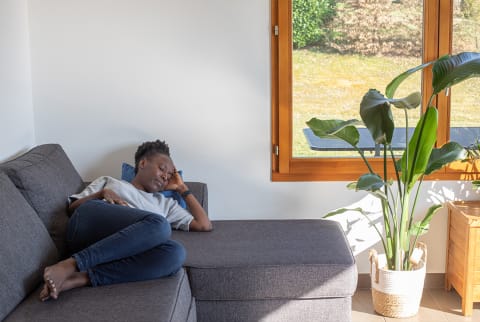The American Academy Of Sleep Medicine Doesn't Recommend This Popular Sleep Supplement


Sleep is an essential pillar of our overall well-being, so it's no surprise that many people leverage supplements to help them snooze. But there's one popular supplement that the American Academy of Sleep Medicine (AASM)—a professional society for sleep medicine doctors—does not recommend. Here's what to know.
Why the AASM doesn't recommend taking melatonin for sleep.
As registered nurse and Noom coach Christina Graham, R.N., tells mbg, as of 2017, the American Academy of Sleep Medicine updated its clinical practice guidelines and recommended against1 the use of melatonin as a nightly sleep aid because the overall evidence available for its effectiveness was weak.
The professional organization notes that while melatonin may be temporarily helpful for things like promoting sleep in a new time zone, it is not effective for long-term use.
"While it's one of the most popular supplemental sleep aids," Graham says, "there is little evidence to support using melatonin unless you have some specific health issues or circumstances." She adds that some reasons melatonin may not be that effective for sleep include the lack of standardization and quality control over melatonin supplements.
As board-certified sleep expert Michael Breus, Ph.D., previously explained to mbg, "Melatonin is a sleep regulator, not a sleep initiator. Melatonin does not make you feel sleepy; it tells your body it's bedtime. Those are two completely different processes in the brain."
What to try instead.
If you're looking for a better nightly supplement (and your sleep hygiene is already up to par), you might want to consider one that includes magnesium. As Graham explains, "Suboptimal dietary intake of magnesium is incredibly common, and magnesium is important for numerous bodily functions, including sleep."
And for a magnesium-rich, non-habit-forming, and nonhormonal option, allow us to introduce mbg's sleep support+. Taking two capsules of sleep support+ one to two hours before bed provides 120 mg of magnesium bisglycinate, along with relaxing jujube seed extract and PharmaGABA®, to promote deep and restorative sleep.*
The magnesium glycinate in this formula is a highly absorbable and gentle form of magnesium (meaning, no mid-night trips to the bathroom), so it's no wonder 300+ happy reviews from customers say sleep support+ noticeably improved their sleep.*
The takeaway.
The experts at the American Academy of Sleep Medicine know what they're talking about, and their position on melatonin is that it's simply not worth recommending. sleep support+, on the other hand, has ingredients that are science-backed to give you the best sleep of your dreams.* Learn more about the product here.

Sarah Regan is a Spirituality & Relationships Editor, a registered yoga instructor, and an avid astrologer and tarot reader. She received her bachelor's in broadcasting and mass communication from State University of New York at Oswego, and lives in Buffalo, New York.

